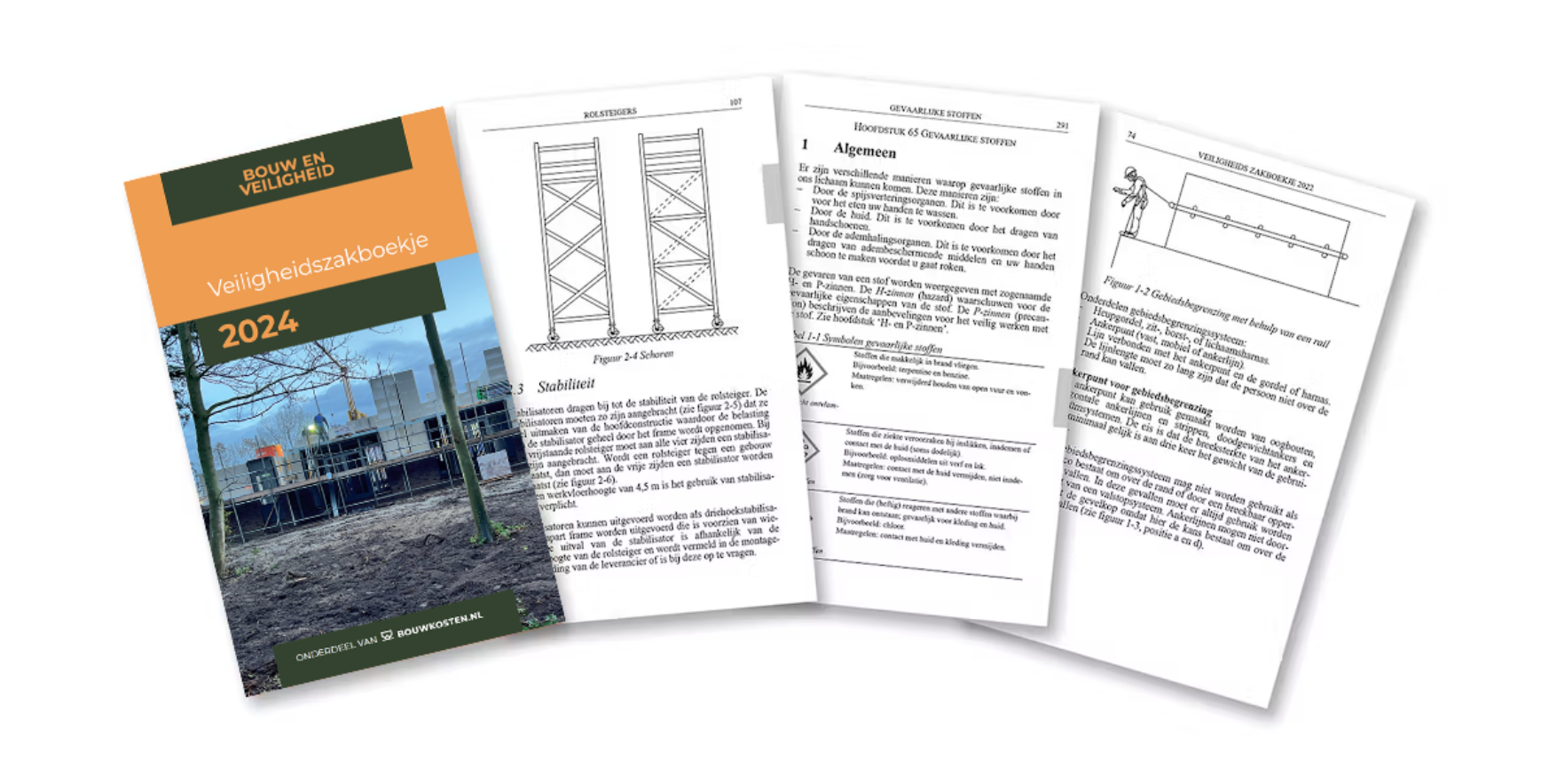In de bouw kunnen er in een mum van tijd onveilige situaties ontstaan. Voor ieder bouwproject is er een uniek proces, waarbij de uitvoering elke keer weer iets anders is. Daarom is het bewaken van een goede veiligheid geen optie, maar noodzaak, zegt IGG Bouweconomie.
Het is belangrijk dat iedereen die op de bouwplaats werkt ook kan toezien op de veiligheid. Het veiligheidszakboekje is gemaakt om ervoor te zorgen dat de beoordeling van (on)veilige situaties op bouwplaatsen veel eenvoudiger en toegankelijker wordt, waardoor iedereen eraan kan bijdragen.
Het veiligheidszakboekje vertelt u precies waar u op moet letten om de veiligheid op de bouwplaats te waarborgen.

Praktische checklists
Het veiligheidszakboekje biedt praktische checklists die helpen bij het correct en efficiënt beoordelen van bijna alle werksituaties op bouwplaatsen. Of het nu gaat om het veilig opzetten van steigers, het correct gebruiken van machines en materieel, of het identificeren van potentiële gevaren; het veiligheidszakboekje zorgt ervoor dat iedereen op de bouwplaats een actieve rol kan spelen in de veiligheid. De informatie in het veiligheidszakboekje is onafhankelijk en wordt jaarlijks bijgewerkt om te voldoen aan de meest recente wet- en regelgeving.
Voor wie is het veiligheidszakboekje?
In de bouwsector heeft de veiligheidscoördinator vaak de centrale rol om het veiligheidsbeleid op te stellen en te implementeren, maar ook het uitvoeren van risicobeoordelingen, het geven van veiligheidstrainingen en het toezicht houden op de naleving van veiligheidsvoorschriften op de bouwplaats. Veiligheid is uiteindelijk een gedeelde verantwoordelijkheid van iedereen op de bouwplaats. Bovendien hebben weersomstandigheden en andere situaties invloed op de veiligheid, waardoor een veilige situatie snel kan omslaan. Door alert te zijn op de bouwplaats en regelmatig een werksituatie onder de loep te nemen, kunnen onveilige situaties worden gesignaleerd voordat ze problemen opleveren.
“Of u nu een ervaren bouwvakker, een projectmanager of een nieuwkomer in de bouwsector bent, het veiligheidszakboekje vertelt u precies waar u op moet letten om de veiligheid op de bouwplaats te waarborgen”, aldus IGG Bouweconomie.
Meest actuele informatie
Het veiligheidszakboekje bestaat uit een fysiek boekje en sinds kort ook een online database (bouwenveiligheid.nl) waarop alle checklists eenvoudig te doorzoeken zijn. Het fysieke veiligheidszakboekje bevat de meest actuele informatie met bijbehorende wet- en regelgeving. Het veiligheidszakboekje is ingedeeld in zeven hoofdstukken, waardoor alle veiligheidsvoorschriften overzichtelijk zijn gecategoriseerd. Het is volgens de makers een handig naslagwerk die professionals altijd bij de hand kunnen hebben op de bouwplaats.
De online database, te vinden op bouwkosten.nl, biedt een handige zoekfunctie waarmee de checklists voor verschillende situaties direct kunnen worden opgezocht.
Met een abonnement op de online database biedt het fysieke veiligheidszakboekje en onbeperkt toegang tot de website, voor een vaste prijs per jaar.
Volledig interactief
In de nadere toekomst wil IGG Bouweconomie het veiligheidszakboekje beschikbaar maken op alle apparaten. “Dit betekent dat je met de telefoon of tablet eenvoudig de juiste checklist voor jouw werksituatie op kunt zoeken, de check kunt doorlopen, foto’s kunt maken en de gegevens direct kan uploaden. De gegevens die we verzamelen over veel voorkomende gevaarlijke werksituaties op de bouwplaats zullen we in de toekomst zelfs gebruiken om preventief advies te geven, zodat de veiligheid op de bouwplaats nog verder verhoogd kan worden”, aldus de makers.
Laagdrempelig
Het veiligheidszakboekje is volgens IGG Bouweconomie de meest laagdrempelige manier om de veiligheid op de bouwplaats te verhogen. “Met behulp van dit boekje zorg je ervoor dat iedereen kan bijdragen aan de veiligheid in bijna alle werksituaties op de bouwplaats.”
Bekijk ons artikel ook in de Cobouw

